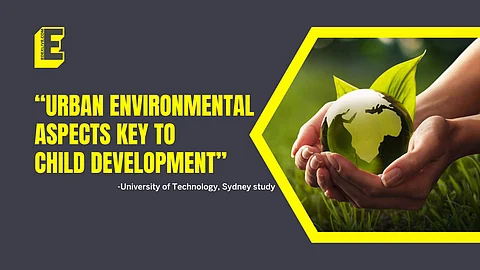

According to new research, key areas of environmental exposure like air and noise pollution, overcrowding and limited green space in one’s early life can impact their development.
The study was led by the University of Technology Sydney, Australia. Analysing 235 research articles from across 41 countries, the researchers have highlighted these key aspects of environmental exposure in childhood to influence growth, reports PTI.
The first 2000 days of life, that is, zero to five years, are recognised as a critical period impacting physical, cognitive, social and emotional health outcomes in later life.
In their study, which was published in the Public Health Research and Practice journal, the researchers identified atmosphere, chemical and metal exposure, neighbourhood-built features, community support, and residential living environment, as other exposure factors crucial to child development.
Since more than sixty per cent of the world's population is expected to live in urban settings by 2030, the team's findings contribute to our understanding of the health risks associated with urban living and can help guide future planning and design efforts to mitigate these outcomes.
"Urban planners and policymakers need to recognise the role that everyday urban environments provide as a foundation for health and wellbeing," said lead researcher Erica McIntyre from the Institute for Sustainable Futures, University of Technology Sydney.
Air pollution was one of the challenges related to urban living that the study looked into the most.
In addition to causing respiratory issues like asthma, the researchers discovered that exposure to pollutants such as particulate matter and chemicals released by industry and cars can have long-term effects on neurological development.
Additionally, they discovered that young children's physical and cognitive development may be impacted by depriving them of essential sensory experiences and exploration possibilities due to limited access to parks, gardens, and other natural areas.
The researchers noted that as mental health problems are becoming more common in children and teens, there is a need to learn more about how urban design elements like having access to green space might support mental health.
"Incorporating child-friendly designs, advocating for more green spaces, noise and pollution-reduction measures, and walkable neighbourhoods that encourage physical activity are just some of the measures that help create environments conducive to healthy child development," said McIntyre.
Due to the fast-paced nature of the city, parents and caregivers are left feeling disconnected and overwhelmed. This leads to them lacking the vital support networks crucial for healthy infant development.
As a result, the families face challenges such as social isolation and limited community support, the researchers said.
"Programmes providing parenting classes, play groups, and community centres can foster connections and support networks crucial for navigating the challenges of parenting," said McIntyre.
She also emphasised the need for further research, policy advocacy, and community involvement to address the challenges of raising children in urban settings.
